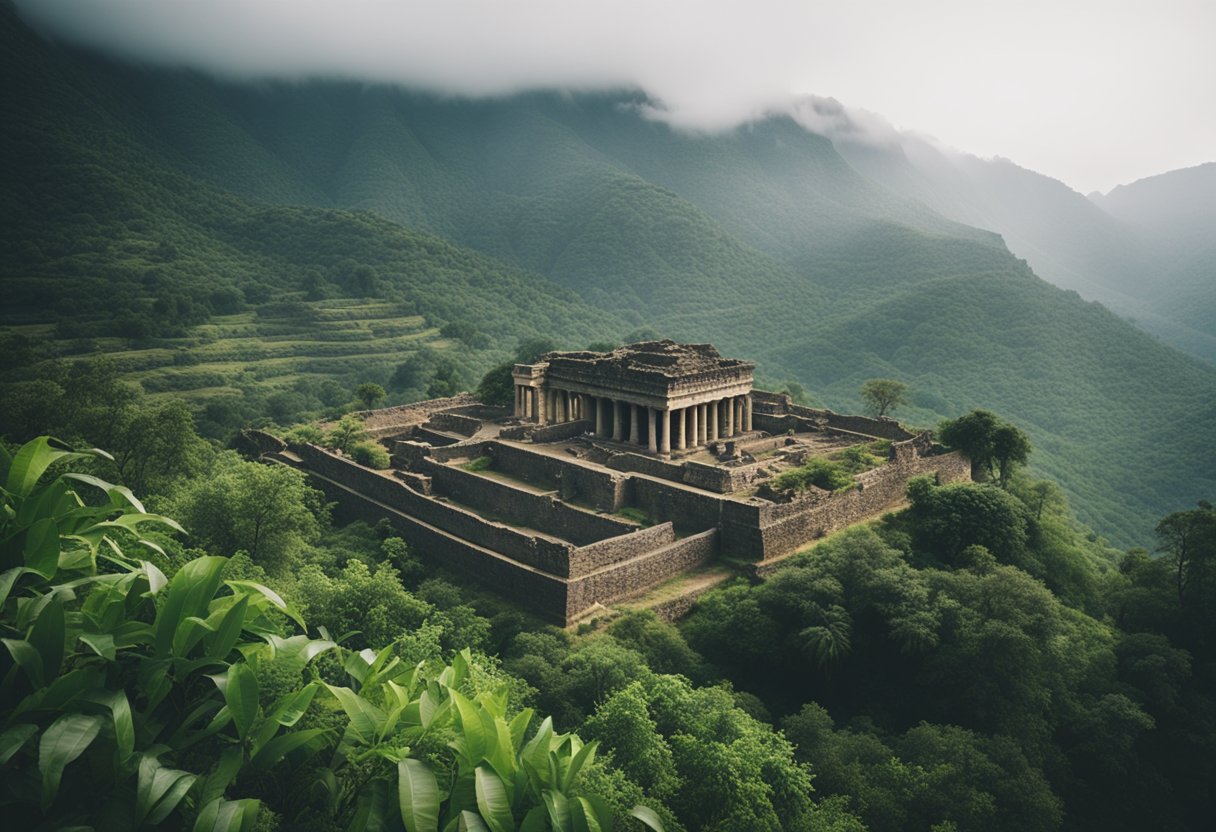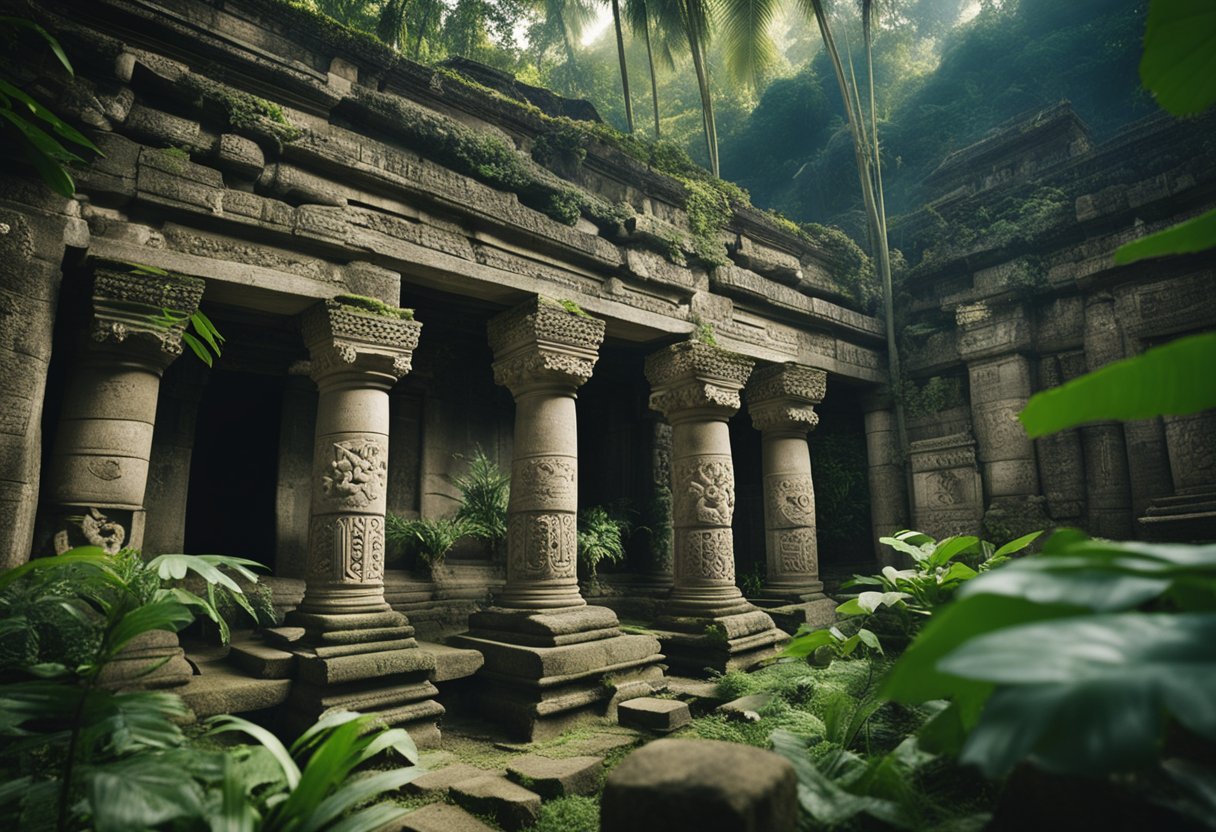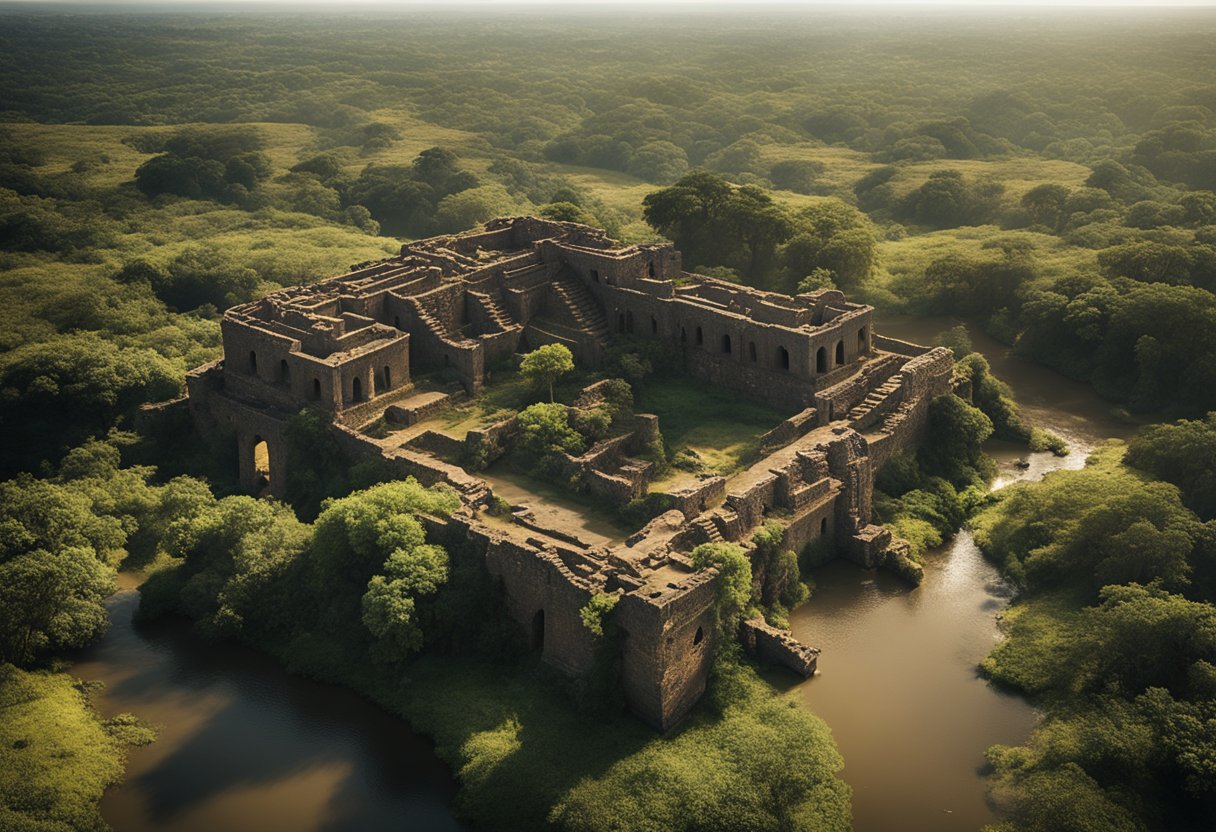The Lost Kingdoms of Africa and Their Histories: Unveiling Ancient Civilisations

Updated On: April 23, 2024 by Fatma Mohamed
Today, we have a captivating story about The Lost Kingdoms of Africa. In our exploration, we found that Africa’s rich tapestry of history is woven with stories of magnificent civilisations that rose, thrived, and eventually became lost to the sands of time. The lost kingdoms of Africa, which extend from ancient Egypt’s mighty dynasties to the Benin Empire’s artistic legacy, showcase the continent’s diverse historical depth. These kingdoms, each with their distinct narrative, have contributed significantly to what we understand about Africa’s past.

Our exploration of these lost kingdoms will not only chart the geographical framework within which they flourished but also venture through a chronology that demonstrates their rise and fall. We unravel the stories of prominent empires, the bustling trade and economic activities central to their prosperity, and the profound artwork and cultural artefacts that survive as testaments to their sophistication. The roles of African monarchs, their influence, and the eventual impact of colonialism on these great realms are pivotal points in our quest. The resurgence of interest in these kingdoms paves the way for modern perspectives and answers to frequently asked questions surrounding their histories.
Table of Contents
Geographical Framework
In examining the vast landscapes of Africa, we find that geography profoundly influenced the rise and fall of its many civilisations. From river valleys fostering ancient kingdoms to the arid expanse of the Sahara shaping nomadic cultures, the continent’s physical features have been both a cradle and a barrier to human development.
River Civilisations
The lifeblood of African civilisations, especially in the north-east, has been the Nile River. This mighty river’s predictable flooding patterns allowed agricultural practices to flourish, leading to the rise of revered kingdoms in both Egypt and Nubia. Similarly, the Niger River in West Africa enabled the growth of wealthy trading empires, such as Ghana, Mali, and Songhai, which thrived on commerce along its banks.
The Sahara and Sub-Saharan Africa
The Sahara Desert forms a vast, arid barrier that separates North Africa from Sub-Saharan Africa, influencing trade and cultural exchange. Despite harsh conditions, trade routes crossed this expanse, connecting the Mediterranean world with the Sub-Saharan regions. To the south, the lush savannas and rainforests supported diverse kingdoms with varying degrees of complexity and interaction.
East vs West African Kingdoms
Contrasts in terrain and climate exist between East and West Africa, each giving rise to distinct societies. In the east, kingdoms such as Aksum near the Red Sea benefited from maritime trade with Arabia and India. In contrast, West African empires like those along the Niger River were largely landlocked, relying on overland trade routes for their wealth and cultural exchanges.
Chronology of African Kingdoms

We’ll travel through time to explore the rise and fall of significant African kingdoms, tracing the lineage from the ancient civilisations to the pre-colonial states. Each era is marked by distinguished cultures and accomplishments that have shaped the history of the continent.
Ancient Kingdoms
In Egypt, the Pharaonic civilisation thrived along the Nile for over three millennia, marked by monumental architecture like the pyramids. South of Egypt, Nubia, known for the Kingdom of Kush, left behind impressive archaeological sites such as the pyramids of Meroë. During the same epoch, the Kingdom of Punt is remembered for its trade expeditions with Egypt.

Medieval Empires
The Ghana Empire emerged in the 4th century as a powerful state due to its control over trans-Saharan trade routes. Notable for its immense wealth was also Mali, with figures like Mansa Musa, who is still celebrated for his legendary Hajj and investments in Mali’s infrastructure and education. Across the Horn of Africa, Ethiopia stood tall, evidenced by the unique rock-hewn churches of Lalibela.
Pre-Colonial States
The Zulu Kingdom became a dominant force in the 19th century, known for its military prowess under King Shaka. West Africa’s Kingdom of Benin flourished between the 11th and 19th centuries and was renowned for its art, particularly the intricate Benin Bronzes. These states, alongside many others, exemplify the rich tapestry of Africa’s history just before colonial influence reshaped the continent.
Prominent African Empires
In our exploration of the rich tapestry of African history, we turn our attention to the grandeur of prominent African empires. These civilisations were powerhouses in their time, with influence that stretched across trades, cultures, and innovations.
Kingdom of Kush
The Kingdom of Kush, centred in what we now know as Sudan, serves as an exemplary story of power and cultural richness. For centuries, Kush was a pivotal part of the Nubia region, with the ancient city of Meroë as its heart. The remains of the city, approximately 200 km northeast of Khartoum, are a testament to the mastery of iron smelting that the Kushites commanded. Renowned for its pyramids and having once conquered Egypt, Kush is a fascinating chapter in history often overshadowed by its northern neighbour.
- Location: Sudan (Nubian region)
- Capital: Meroë
- Prominence: Mastery of iron smelting, conquest of Egypt
Learn more about the Kingdom of Kush’s influence and history on HISTORY.
Empire of Mali
When we discuss wealth and wisdom in African history, the Empire of Mali takes centre stage, ruled by none other than the legendary ruler Mansa Musa. Flourishing in the 14th century, the empire expanded its reach over a significant portion of West Africa. This grand empire is synonymous with prosperity and is often noted for Mansa Musa’s pilgrimage to Mecca, during which his generosity affected the economy of the regions through which he travelled.
- Key Figures: Mansa Musa
- Notable Events: Mansa Musa’s pilgrimage to Mecca
- Legacy: Economic prosperity and cultural significance
Discover the impact of the Empire of Mali on modern-day countries like Senegal and Ghana on Live Science.
Great Zimbabwe
The tale of Great Zimbabwe is one that resounds with architectural prowess and economic might. At the heart of Zimbabwe, this empire etched its name into the annals of history with its monumental stone structures and impressive city planning that remain awe-inspiring. The empire thrived from the 11th to the 15th century, and its capital, Great Zimbabwe, was a hub of trade and culture; its influence felt far and wide across the African continent.
- Renowned For: Monumental architecture, extensive trade networks
- Period of Dominance: 11th to 15th century
- Main Trade Commodities: Gold and ivory
For more insights into the architectural achievements of the Great Zimbabwe empire, you can read about it on World History Edu.
Trade and Economy in African Kingdoms
African kingdoms thrived on commerce, with trade routes and resources like gold and salt shaping their economies. Our focus here is on the trade networks that connected West Africa with the wider world, as well as the key commodities that drove their wealth and influence.
Trans-Saharan Trade Routes
The Trans-Saharan trade routes connected us to North Africa and beyond, setting the stage for cultural and commercial exchanges. Our ancestors and the Berber traders pioneered these routes, navigating the vast and challenging Sahara. They exchanged goods like gold, ivory, and kola nuts, which were highly sought after in various parts of the world.
Gold and Salt Commerce
West Africa was famously rich in resources, notably gold, which was found in the Ghana, Mali, and Songhai empires. This gold was traded for salt, a vital and scarce commodity in the Sahel, procured by Berber merchants. The trading of these two essential goods not only fuelled our economies but also established the region as a hub of influence and prosperity.
Trade with Europe and Asia
Our involvement in global trade dramatically increased with the arrival of European and Asian traders. Our gold, for example, was a major draw for the Portuguese, leading to an increase in commerce between West Africa and these new partners. The resultant exchange of goods, ideas, and even people bridged continents and played a significant role in the development of international trading systems.
In this section on Trade and Economy in African Kingdoms, we have outlined the critical routes and resources underpinning the economic foundations of ancient Africa. Our ancestors’ engagement in trade substantiates the continent’s connectivity and contribution to the global economy centuries ago.
Art and Culture

In the vast tapestry of Africa’s history, art and culture represent an unbroken dialogue between past and present. We find this dialogue in the finesse of the Benin Bronzes, the majesty of Ethiopian rock-hewn churches, and the enduring legacy of oral traditions.
Benin Bronzes
The Benin Bronzes are a testament to the prowess of African genius in artistry. Crafted from the 13th century onwards, these intricate metal plaques and sculptures are emblematic of the Kingdom of Benin’s cultural and royal heritage. An art historian might note that they not only exemplify the high level of sophistication achieved by the Benin culture but also reflect the society’s structure, hierarchy, and practices.
Rock-Hewn Churches
In Ethiopia stands an architectural marvel of the African continent—the Rock-Hewn Churches of Lalibela. Carved from solid rock in the 12th and 13th centuries, these structures speak of a period when Ethiopian Christianity was flourishing. Each church is a monolithic structure, intricately executed, showcasing a deep-rooted Christian tradition intertwined with unique African elements.
Oral Traditions
Oral Traditions have long been the custodians of Africa’s heritage, preserving history, values, and laws through the spoken word. This age-old practice encompasses a rich variety of forms, including epic narratives, proverbs, and poems. Much of Africa’s history and cultural knowledge has been preserved thanks to the skilled storytellers who conveyed complex ideas and tales through generations.
Influences and Interactions

As we explore the intricate tapestry of Africa’s history, it is crucial to understand that the continent’s lost kingdoms were not isolated entities. They were hubs of religious and cultural exchanges that drastically shaped their trajectories. These interactions were significantly influenced by the spread of major religions and encounters with European powers.
Spread of Christianity and Islam
The introduction of Christianity and Islam in Africa was a pivotal factor in the historical development of its kingdoms, particularly influencing Egypt, which became an early centre of Christianity after the evangelist Mark travelled there in the 1st century AD. Over time, Christianity spread further, reaching the Kingdom of Aksum, which now encompasses modern Ethiopia and Eritrea, asserting itself as part of the kingdom’s identity.
Islam entered Africa following its inception, transforming regions like Senegal and Nigeria through trade routes. Key Islamic centres, such as Timbuktu and Gao in the Niger River Valley, became vital in spreading Islamic culture and education.
European Contact
Our understanding of Africa’s lost kingdoms, such as those in Senegal and Nigeria, would be incomplete without considering the impact of European contact. While initial interactions revolved around trade and included the exchange of goods such as gold and salt, European influence soon expanded. This was marked by often exploitative colonial agendas that resulted in significant shifts in governance and society within these kingdoms.
Europeans established trade posts along the coast of Senegal during the Age of Exploration, which later evolved into deeper political and military involvement, altering the local dynamics. Similarly, Nigeria experienced significant change in its socio-political landscape with the arrival of Europeans, ultimately leading to the establishment of colonial rule after a series of events and treaties.
These historical intersections continue to manifest in Africa’s modern-day cultural and religious landscapes.
The Role of African Monarchs

African monarchs have played a pivotal role in shaping the continent’s history, whether as rulers of powerful kingdoms such as Ghana and Nigeria or through significant figures like Mansa Musa of Mali, who was renowned for his wealth and pilgrimage. Their governance has ranged from centralized kingdoms to complex matriarchal societies, often intertwined with religious influences.
Kings and Queens
African kings and queens were central figures in governance and were often seen as divine or semi-divine. Ghana was one of the first known African kingdoms in the region, led by a king who enforced strict trade laws that contributed to the kingdom’s prosperity. In Nigeria, the Oba of Benin presided over a sophisticated court and wielded considerable power. Mansa Musa, the Sultan of the Mali Empire, is often cited as one of the richest individuals in history, and his reign exemplified the grandeur of African monarchies by showcasing immense wealth and influencing Islamic education and architecture.
Matriarchal Societies
While many kingdoms were patriarchal, we also find historical examples where women held significant sway. In matriarchal societies, the ‘queen mother’ played a crucial role in statecraft and succession. Their counsel carried weight in political decisions, and sometimes, they managed state affairs directly, indicating the varied forms of leadership within African monarchies.
The Influence of Religion
Religion steadfastly influenced African monarchs. In the Mali Empire, Mansa Musa’s pilgrimage to Mecca not only reflected his personal piety but also demonstrated the empire’s connection to the wider Islamic world. Such acts reinforced the monarch’s legitimacy and fostered diplomatic ties, showcasing religion as both a personal belief system and a tool for political influence.
Colonialism and Its Impact
As we explore the profound effects of colonialism in Africa, it’s essential to understand how it has reshaped entire societies. From altering political structures to erasing cultural identities, the impact is undeniable.
Loss of Sovereignty
During colonial rule, African nations such as the Kingdom of Benin were stripped of their autonomy. Europeans imposed new borders, disregarding existing social and political orders, leading to a loss of sovereignty that echoes throughout the continent today. This disruption often laid the groundwork for internal strife and conflict.
Cultural and Historical Erasure
In addition to political subjugation, colonial powers attempted to overwrite indigenous cultures and histories. Through both physical destruction of artefacts and enforced cultural assimilation, the rich tapestry of old African kingdoms faced a historical and cultural erasure that has left a considerable void in the continent’s heritage.
Rediscovery and Restoration

The relentless pursuit of understanding our past drives the rediscovery and restoration efforts for Africa’s lost kingdoms, with a focus on archaeological discovery and the return of culturally significant artefacts.
Archaeological Efforts
Archaeological digs across Africa have unveiled numerous monuments and treasures, shedding light on forgotten civilisations. We unearth ruins, recover relics, and decode ancient inscriptions through meticulous excavation. These efforts are instrumental in reconstructing the continent’s robust historical narrative. For example, the significance of Benin City and its 16th-century bronzes has been profound, illuminating the sophistication of the Kingdom of Benin.
Examples include:
- (Ongoing excavations of palaces and fortifications)
- (Discoveries of royal tombs and artisanal workshops)
Repatriation of African Artefacts
Repatriation—the return of artefacts to their country of origin—is critical for cultural restoration. In recent years, we’ve witnessed significant movements to repatriate items, such as the 16th-century bronzes from Benin, taken during colonial times. These items are not merely artefacts; they are fragments of history, embodying the legacy and identity of the people to whom they belong.
Key initiatives have included:
- (Formal requests and negotiations for the return of artefacts)
- (Collaboration with museums and private collectors for repatriation)
Through these subsections, we’ve captured efforts to uncover and honour the grandeur of Africa’s past.
Modern Perspectives

In recent years, our understanding of Africa’s past has undergone significant change, influenced by new research and media portrayals that challenge outdated narratives.
African Historiography
We’ve seen a shift towards a more nuanced approach in African historiography as scholars like Dr. Gus Casely-Hayford work to unveil the complex histories of Africa’s lost kingdoms. Their efforts have led to a factual reassessment that separates myth from history, bringing to light the continent’s rich tapestry of cultures and civilisations that have often been unrecognised or misunderstood.
Media Representations
On the media front, there’s a growing effort to correct misconceptions. Documentaries produced by networks like the BBC, especially on BBC Four, have started addressing the historical biases and are now portraying the continent with more accuracy. These productions aim to educate and inform global audiences by presenting factual, well-researched accounts of Africa’s cultural heritage.
Challenges and Development
In exploring the lost kingdoms of Africa, we navigate through a complex history marked by contemporary conflicts and international development efforts. Through these lenses, we can better appreciate the ongoing journey towards stability and growth.
Contemporary Conflicts
In regions such as Sudan, internal strife has cast a long shadow over the country’s development. Conflicts, often rooted in ethnic divisions and control over resources, have led to significant civilian displacement and loss of life. The Darfur conflict, for instance, has seen severe human rights abuses and a need for substantial humanitarian assistance.
Aid and Development Efforts
Our focus shifts to the role of international aid in fostering development. Nigeria, as Africa’s most populous country, has become a linchpin for development aid targeting health, education, and economic growth. Efforts to combat endemic issues like malaria have garnered support through aid programmes, while structural development aid has aimed at improving the nation’s infrastructure.
Aid, when effectively managed, can bolster these nations’ resilience, empowering them to overcome their complex histories and strive towards a brighter future, echoing our commitment to shed light on culture and progress.
Frequently Asked Questions

In this section, we cover some of the most common inquiries people have about the Lost Kingdoms of Africa. These questions range from understanding which cultures are included under this term to exploring ancient kingdoms’ histories.
Which cultures are included in the term ‘Lost Kingdoms of Africa’?
The term ‘Lost Kingdoms of Africa’ refers to numerous civilisations and cultures on the African continent that have either vanished or left limited historical records. This encompasses not only the well-known ancient civilisations such as Egypt and Carthage but also lesser-known yet significant cultures like the Kingdom of Nubia and the Berber Kingdom.
How can one access documentaries or series on African historical kingdoms?
Documentaries and series on historical African kingdoms can be found on various broadcasting platforms, such as BBC Four, which offers an extensive guide to the Lost Kingdoms of Africa series. Other streaming services may also host similar content.
What are some notable pre-colonial kingdoms in Africa?
Notable pre-colonial kingdoms in Africa include the aforementioned Nubian kingdom, alongside the Kingdom of Axum, the Mali Empire, and the Great Zimbabwe. Each of these entities contributed significantly to Africa’s rich historical tapestry.
Can you name a few prominent empires in Africa’s history?
A few prominent empires that mark Africa’s history are the Mali Empire, known for its wealth and scholarship under Mansa Musa, the Ghana Empire with its formidable trade networks, and the Songhai Empire, which stood as one of the largest Islamic empires in history.
What is known about the history of the Nubian kingdom?
The history of the Nubian kingdom is marked by a rich and powerful civilisation located along the Nile, which interacted with and held its own against ancient Egypt. Nubia was known for its archers and was a centre of trade and cultural exchange.
What constitutes the oldest known history in Africa?
The oldest known history in Africa dates back to the dawn of human civilisation, with archaeological evidence suggesting that human life originated on the continent. The Ancient Egyptian civilisation, the pyramids, and pre-dynastic cultures demonstrate the deep historical roots present in Africa.






